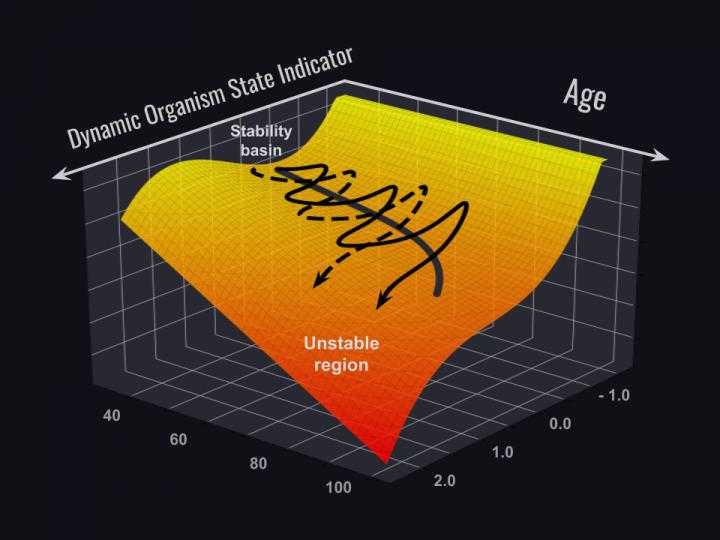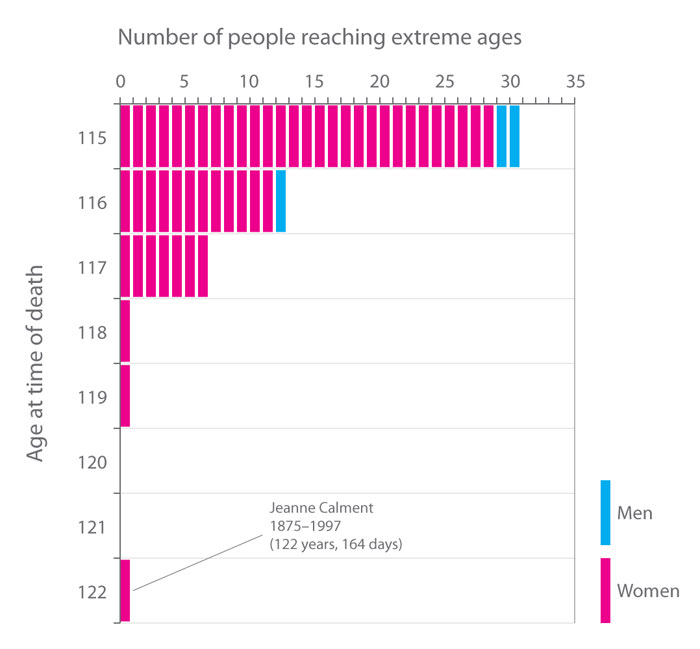
29th May 2021 Humans could live to 150, according to study The theoretical maximum lifespan for humans is between 120 and 150, according to a longitudinal analysis of blood markers.
Scientists have published the results of a study on the associations between aging and the body's loss of ability to recover from stresses. The work involved a team from Gero – a Singapore-based biotech company – in collaboration with Roswell Park Comprehensive Cancer Center in Buffalo, New York. Their paper appears in the journal Nature Communications. In recent years, numerous longevity-related breakthroughs have occurred in animal models. Last year, for example, young blood plasma given to older mice reduced aging by an average of 54% across multiple tissues. Dozens of clinical trials are now underway to reverse aspects of the aging process in humans. Biological clock types can predict more years of life for those who pick healthy lifestyles or quit unhealthy ones, such as smoking. What remains unknown, however, is how quickly biological age is changing over time for the same individual; in particular, how one would distinguish between transient fluctuations and the genuine change in a biological age trend. The emergence of big data in medicine involving multiple measurements from the same subjects can provide a whole range of novel opportunities and practical tools to understand and quantify the aging process in humans. Experts from Gero and Roswell Park have this week presented results from a detailed analysis of fluctuations in physiological indices along individual aging trajectories. Based on their data, healthy human subjects turned out to be very resilient, whereas the loss of resilience turned out to be related to chronic diseases and elevated all-cause mortality risks. The researchers' paper highlights a key finding: the rate of recovery to equilibrium baseline level (following body stresses) deteriorated with age. Accordingly, the time needed to recover became longer and longer. A person of 40, for example, took about two weeks to return to equilibrium baseline level, while this recovery time stretched to six weeks for the average 80-year-old. The researchers confirmed this finding in two different datasets based on two different kinds of biological measurements – blood test parameters on one hand and physical activity levels recorded by wearable devices on the other. "Calculation of resilience based on physical activity data streams has been implemented in GeroSense iPhone app and made available for the research community via web-based API," said Dr Tim Pyrkov, the study's first author and head of Gero's mHealth R&D division. From this data, the researchers found a "stability basin" in youth and middle age, falling rapidly into an "unstable region" during old age. If this trend holds at even later ages, the extrapolation shows a complete loss of human body resilience at some point between the ages of 120 and 150. Beyond that point, the length of time needed to recover is so great that it becomes physically impossible for anyone to return to equilibrium.
"The predicted loss of resilience even in the healthiest, most successfully aging individuals, might explain why we do not see an evidential increase of the maximum human lifespan, while the average lifespan has steadily grown during the past decades," the researchers write. "The divergent fluctuations of physiological indices may mean that no intervention that does not affect the decline in resilience may effectively increase the maximum lifespan and hence may only lead to an incremental increase in human longevity." "This work by the Gero team shows that longitudinal studies provide novel possibilities for understanding the aging process and systematic identification of biomarkers of human aging in large biomedical data," said Brian Kennedy, Distinguished Professor of Biochemistry and Physiology at National University Singapore. "The research will help to understand the limits of longevity and future anti-aging interventions. What's even more important, the study may help to bridge the rising gap between the health- and lifespan, which continues to widen in most developing countries." "This work, in my opinion, is a conceptual breakthrough because it determines and separates the roles of fundamental factors in human longevity – the aging, defined as progressive loss of resilience, and age-related diseases, as 'executors of death' following the loss of resilience," said Andrei Gudkov, PhD, Sr. Vice President and Chair of Department of Cell Stress Biology at Roswell Park, and study co-author. "It explains why even most effective prevention and treatment of age-related diseases could only improve the average but not the maximal lifespan – unless true anti-aging therapies have been developed." "The investigation shows that recovery rate is an important signature of aging that can guide the development of drugs to slow the process and extend healthspan," said David Sinclair, Professor of Genetics at Harvard Medical School. "Measuring something is the first step before producing an intervention," said Peter Fedichev, PhD, co-founder and Chief Science Officer at Gero. Now that his team has measured this independent pace of aging, the next steps will be to find ways to "intercept the loss of resilience."
Comments »
If you enjoyed this article, please consider sharing it:
|









